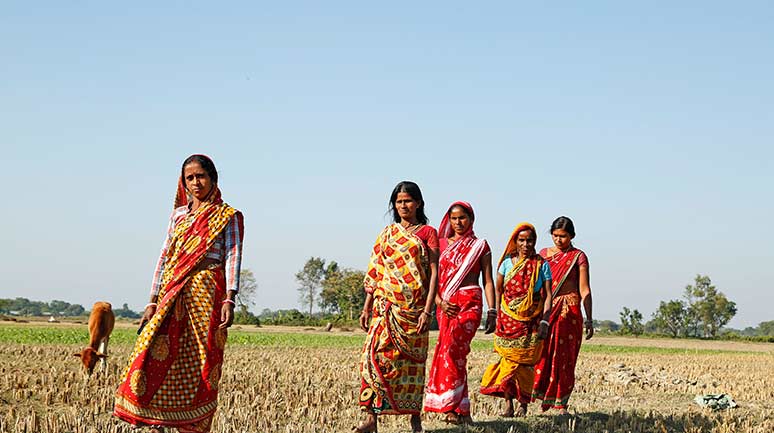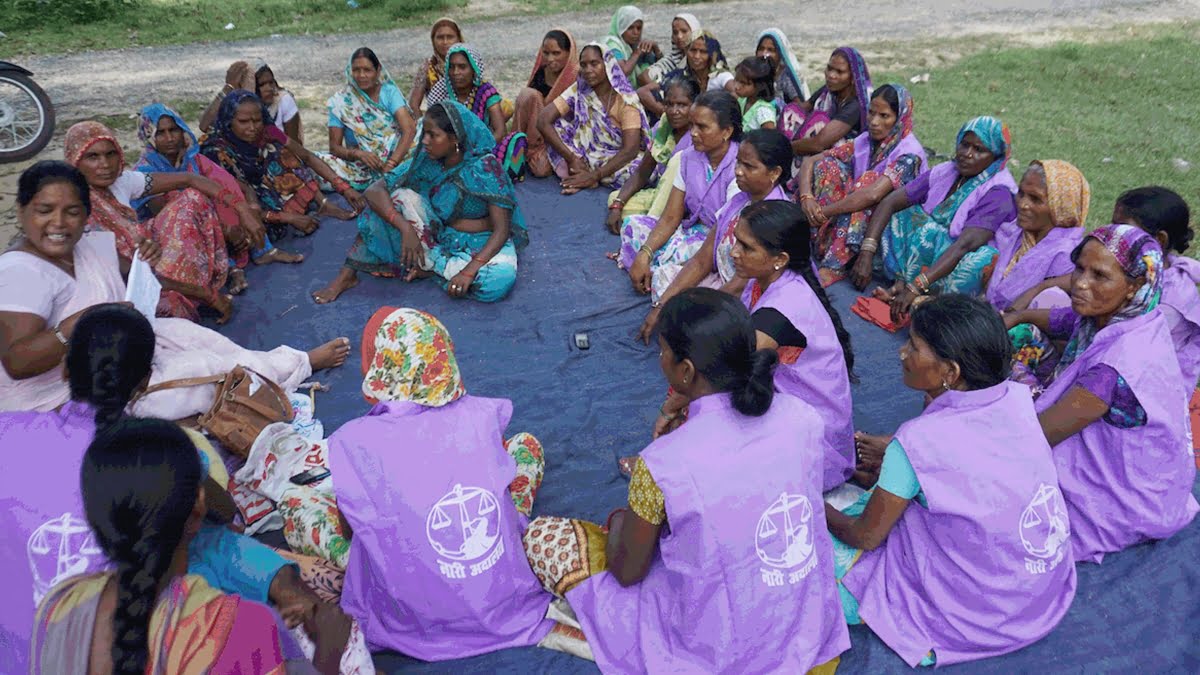Late January when I got to Sitapur (close to Lucknow) in Uttar Pradesh on a balmy afternoon, I saw about 60-70 women in an intense discussion. It was a fascinating sight, especially because all of them were dressed in pink saris in UP style and their coat was purple in colour.
They continued their conversation despite new entrants like me. One of the women, the oldest in the group, was talking to an elderly couple and their daughter who had come seeking redressal. Their son-in-law had migrated to Mumbai six months ago to work in a construction site. He had called up his wife a few times since. One of the last calls he had made was to inform them that he recently got remarried in the city and would not come back.
The young woman was devastated. Even though they had a patchy marriage and she was keen to sort things out and be with her man. When all failed, she came to the Nari Adalat in the village. These women asked her a lot of questions and assured her that the man’s act was illegal. They began tracing contacts in a way to summon him to the village. The woman was assigned a case worker who assured her that by the next session, her husband will be back. Nari Adalat – a system of alternative dispute resolution systems run by women – is something I came across as a part of my work which involves understanding and covering issues of violence against women, particularly domestic violence and intimate partner violence.
Also read: Why The Panchayat Systems Need An Immediate Overhaul
Nari Adalat – a system of alternative dispute resolution systems run by women – is something I came across as a part of my work which involves understanding and covering issues of violence against women, particularly domestic violence and intimate partner violence.
I always knew of Nari Adalats but this was the first time I saw one functioning. The adalat comprises approximately of 12 to 20 women from all ages. They are regular women from the village and are provided the training in gender-related issues and laws for women by the Mahila Samakhya programme launched in 1988 to provide remedial solutions especially at the grassroots.
So what makes the Nari Adalat so powerful that they can summon any man in a patriarchal UP? Will the men heed to their authority? Why?
Grassroots women’s movements in India, are no exception to the larger global feminist movement. Rural women leaders challenge and hold local institutions accountable by ensuring that their functioning is transparent and that they address the needs of the community.
Alternative Dispute Resolution (ADR) systems are not new to India. They are means to settle disputes outside the regular courts with an able and effective, neutral intermediary, meant to reduce the burden on courts. Nari Adalat, a strategy of Mahila Samakhya, is one such ADR.
ADRs are formed on the basis of the provisions under our constitutional fundamental rights stated explicitly from Article 14 to 21. Mainly constituted to make immediate and socio-economic justice with legal aid accessible, there are different means for ADRs – arbitration, mediation, conciliation, lok adalats and so on.
While I’m calling everything out of court as ADR, the ones well known to us are the Panchayats and the Khaps. These, while are also dispute resolution systems, are more community-based and ideally constituted for the larger benefit of the community. On the other hand, the nari adalats and mahila panchayats are more women-centric and attempt to resolve disputes that women face within the community who have a thorough system of case work in place. The flexibility and easy access allows them to begin the hearing soon after the complaint is received. There is a team appointed to do follow-ups with the case and regularly visit the site, if necessary.
The Nari Adalats and mahila panchayats are even more important, considering how khap panchayats are notorious for upholding patriarchal conservative values and denying women their rightful autonomy by even employing means of torture.
The Nari Adalat and mahila panchayats are even more important, considering how khap panchayats are notorious for upholding patriarchal conservative values and denying women their rightful autonomy by even employing means of torture.
Further, attitudes such as victim blaming, survivor shaming, apart from significant other barriers to justice like an eternal waiting period, lack of empathetic lawyers or robust judiciary makes a woman think twice before going to court. This, along with the absence of critical survivor support like one stop centres, healthcare, counselling, legal aid and witness protection make it impossible to even think of accessing justice.
As a woman in a city like Bangalore, if I were abandoned by my family (in-laws and husband), or violated, I will have limited options. I will have to file a case in the family court and wait my turn to get a hearing and justice. This also comes with a certain social capital and privilege: If I have the money to take on my marital home, the education to be wary of exploitation and the time to fight my case. Especially in a city, my community, neighbours and others in society will not necessarily come forward in my aid either. Even if they did, they would have no powers in such a situation.
Further, to get a lawyer who will fight for us, instead of leaving us feel small, compromised and humiliated through the process, is also a difficult negotiation to make especially in a city.
When it comes to Nari Adalats and mahila panchayats, things are different. They are a bunch of women from the same village and even same community. Their sensitisation and training is such that the emphasis is on a feminist ideology that asks for justice for the aggrieved. They learn the law in their own way, understand violence to the extent that it is unjust and illegal and know quickly to be objective and committed to justice. Because they come from the same community as the family with the case, they wield a lot of power and influence over them. The village listens to them, knowing that they are better off than messing with these women!
Because these courts are community-based and are comprised of women, it evokes a sense of “safe space” among the survivors, thus encouraging them to open up more. The approach of dispensing justice too is simple and interesting. Contrary to what happens in a formal justice system, the final verdict is passed giving equal chance to both parties. The verdict is sometimes finalised by a notarised document which holds significant customary value for its compliance.
These courts facilitate linkages to formal justice mechanisms (like family courts and the police) thus further facilitating access to justice from the women from rural India.
In the Sitapur case, when I followed up later, to my pleasure, I was told that the husband came back to the village after being traced and summoned by the Nari Adalat. He apologised to his wife and to the community and was forced to stay back in the village. The wife too was given some instructions on participating more in the financial commitments of the family and be active in future planning. Further, a family once addressed by mahila panchayats and Nari Adalats will stay surely under the radar in fear of earning the wrath of the community.
One of the stories I heard on the ground made me go cold. This was in another district in UP where the Nari Adalat women had not seen the “bahu” of a household for long. They walked to the house of the “bahu”. The husband and in laws said she was unwell and that she had gone to her parents’ house. The Adalat women found this fishy and stayed there for the entire day. The next day on realising all was not well, they ordered the digging of the side and back yard of the house and found that the daughter in law was killed and buried in the name of dowry.

Also read: These Four Grassroots Women Leaders Travelled Across the Country for Land Rights
A huge protest at the district level and the District Protection Officers’ location followed till the family was taken to task legally. One of the women told me something that I will carry for life. She said that women are not evil. Patriarchy makes them slaves to men and they are forced to be cruel with other women to please their men!
We have a lot longer to wait for gender justice as such, where the thick walls of powerful men and powerless women will melt away through education, awareness and emancipation of men and women. Till such time, these adalats structured for, of and by women will live on!
Priya is the founder of Durga, a citizens initiative that equips women and girls deter sexual harassment in public spaces. Though a Chartered Accountant by Profession, Priya realised that she has more interest towards development issues and spent about 10 years with the British Government in India, working on Healthcare and Life Sciences as a National Lead. Priya holds deep empathy and connect with the vulnerable particularly women and girls who are survivors of gender based violence and abuse. This is the passion that makes her run Durga, in Bangalore for the last 10 years, through which she engages with youth to build gender equitable spaces. Priya is also the Lead of Gender Justice and Disabilities at the Azim Premji Philanthropic Initiatives. An avid reader of the different waves of Feminism the world has seen, student of a Masters in Gender and Women Studies, Tedx Speaker and traveller, Priya tries to learn Carnatic music (intermittently) in her spare time. Priya can be found on Facebook, Linkedin, Twitter as well as here.
Featured Image Source: Newslaundry




